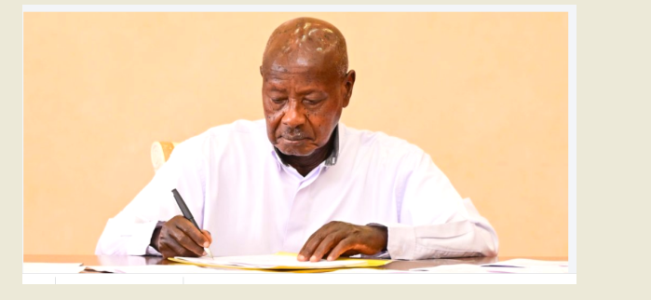President Yoweri Kaguta Museveni has signed into law the Uganda Peoples’ Defence Forces (Amendment) Act, 2025, triggering widespread condemnation from legal experts, opposition leaders, and human rights organizations. The new legislation expands the authority of military courts, allowing them to try civilians under certain conditions, despite a recent Supreme Court ruling declaring such trials unconstitutional.

Passed by Parliament in May amid sharp opposition, the Act restructures Uganda’s military justice system by establishing a Directorate of Military Prosecutions, formalizing the hierarchy of military courts, and introducing new regulations governing the use of military equipment and attire by civilians. However, the clause permitting military trials of civilians, particularly those found in possession of military gear, impersonating soldiers, or collaborating with Uganda Peoples’ Defence Forces (UPDF) personnel, has sparked intense criticism.
Opposition figures have decried the law as a direct assault on constitutional safeguards. “This is not just a security bill, it is a betrayal of our Constitution,” said Hon. Mathias Mpuuga, Leader of the Opposition in Parliament, who led a walkout of opposition MPs during the bill’s passage. Civil society groups and academics, including Dr. Sarah Mukasa of Makerere University, have warned that the vague language in the law could lead to unchecked prosecutorial power and suppression of political dissent.
In response, the Uganda Law Society (ULS) has announced plans to file a constitutional petition challenging the Act. In a statement issued on June 16, ULS Vice President Asiimwe Anthony reaffirmed the Society’s commitment to defending judicial independence, citing past efforts in Constitutional Petition 18 of 2005. “We remain resolute in our denunciation of policies that undermine the rule of law and constitutional governance,” the statement read, vowing to use its High Profile Case Unit to seek redress for affected civilians.
Despite the uproar, government officials have defended the law as a necessary response to escalating security threats and misuse of military insignia. Defense Minister Jacob Oboth-Oboth emphasized the need for stricter control in light of rising crime involving military-grade weapons. President Museveni, in his signing statement, described the Act as a “modern and necessary tool to uphold discipline and safeguard national security.” Yet, with general elections looming in 2026, critics warn the legislation may serve as a mechanism for political repression, setting the stage for a major constitutional showdown.

